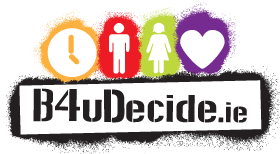B4uDecide.ie is closing down at the end of May 2024.
Alternative sources of relationships and sexuality information and resources:
- For 16-25 year olds: SpunOut.ie is an information provision website, including relationships and sexuality issues.
- For 17+ year olds: Sexualwellbeing.ie is the HSE website that provides information and resources on a wide range of information such as consent, contraception, sexual transmitted infections, vaccinations and unplanned pregnancy
- For parents: The HSE’s ‘Making the ‘Big Talk’ many small talks’ series of booklets to help parents and children talk about relationships and sexuality is available online, and to order free of charge from healthpromotion.ie. HSE funded RSE workshops are available at npc.ie and ifpa.ie
- For teachers: Junior Cycle SPHE Resources are available to support the new 2023 SPHE specification , including the Relationship and Sexuality strand.
- For youthworkers: HSE funded training on relationship and sexuality issues is available at REAL U | Foroige and Tailored Training Courses – National Youth Council of Ireland
Sexual Diversity and Accepting Sexuality
People have diverse sexual identities; ‘orientation’ (who you are attracted to) and ‘gender identity’ (whether and how you identify as a male or female) are two aspects of this identity.
In terms of orientation, you may be straight, gay, lesbian or bisexual and/or know people who are (a very small minority of people identify as being ‘asexual’ i.e. having no feelings of sexual attraction).
In terms of gender identity, you may be a person, and know loads of other people, whose personal sense of identity matches their biological sex and the gender identity they were given at birth. You may also be someone, or know someone, who doesn’t identify with the gender they were given at birth (this is known as being ‘transgendered’).
Being able to express these parts of your sexuality is very important and should be respected, it is also very important to respect other people’s orientation and gender identity.
Although more people are coming out as gay, lesbian, bisexual or transgender in their teenage years, very often people do not come out until they are older. Because of this you most likely know people who are gay who just haven’t told you. They may feel that they can’t tell you because they fear a bad reaction. This fear is well founded as homophobic bullying is widespread. We all have a part to play in ensuring that such bullying is not tolerated and that everyone is respected.
Homophobic and transphobic bullying is when people behave or speak in a way which makes someone feel bullied because of their actual or perceived sexuality. People may be a target of this type of bullying because of their appearance, behaviour, other physical traits or because they have friends or family who are gay, lesbian, bisexual, or transgender or just because they are seen as being different.
Like all forms of bullying, homophobic bullying can be through name calling, spreading rumours, physical or sexual, and emotional abuse.
It’s important that you show that you are open and positive to everyone’s identity and that you don’t:
- Tease people by saying that they are gay, or using the word ‘gay’ when taking about a bad film for example. This can be really hurtful and cause people to withdraw into themselves.
- Be mean to people who have come out as lesbian, gay, bisexual or transgender. It is very brave of them to do so and they should be supported and treated with the same respect as everyone else.
If you’re being bullied you need to tell your parents and report it to a teacher. There are also support services that you can contact like BeLongTo Youth Services.
If you are gay, lesbian, bisexual or transgender, check out the BeLonG To Youth Services website.
